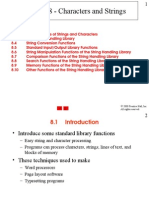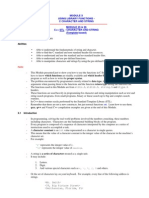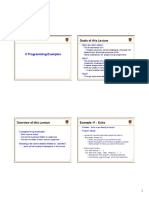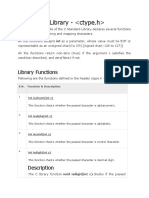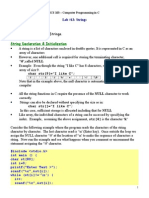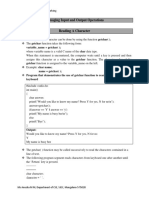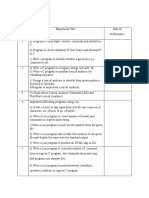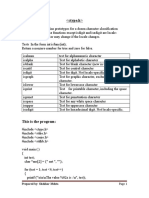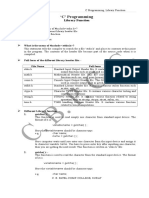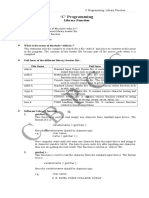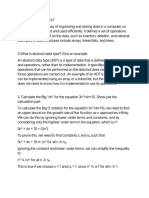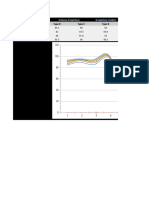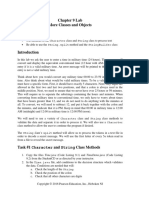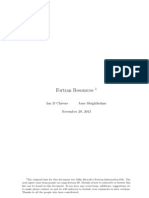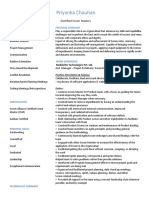Strings
Uploaded by
purnanandareddychinthapalliStrings
Uploaded by
purnanandareddychinthapalliCharacters
and Strings
22/10/24 IIT Hyderabad 1
We will learn
• Fundamentals of strings and characters
• Character-handling library
• Standard input/output library functions
• String-manipulation functions of the string-handling library
• Manipulation functions of the string-handling library
• Comparison functions of the string-handling library
• Other functions of the string-handling library
22/10/24 IIT Hyderabad 2
Motivation
• Introduce some standard library functions
• Easy string and character processing
• Programs can process characters, strings, lines of text, and blocks of memory
• These techniques used to make
• Word processors
• Page layout software
• Typesetting programs
22/10/24 IIT Hyderabad 3
Fundamentals of Strings and Characters
• Characters
• Building blocks of programs
• Every program is a sequence of meaningfully grouped characters
• Character constant
• An int value represented as a character in single quotes
• 'z' represents the integer value of z
• Strings
• Series of characters treated as a single unit
• Can include letters, digits and special characters (*, /, $)
• String literal (string constant) - written in double quotes
• "Hello"
• Strings are arrays of characters
• Access a string via a pointer to its first character
• Value of string is the address of first character
22/10/24 IIT Hyderabad 4
Fundamentals of Strings and Characters
• String definitions/Initializations
• Define as a character array or a variable of type char *
char color[] = "blue";
char *colorPtr = "blue";
• Remember that strings represented as character arrays end with '\0'
• color has 5 elements
• Inputting strings
• Use scanf
scanf("%s", word);
• Copies input into word[]
• Do not need & (because a string is a pointer)
• How to read only required no. of characters?
• Remember to leave room in the array for '\0’: Otherwise overwrite/error
22/10/24 IIT Hyderabad 5
Character Handling Library
• Character handling library
• Includes functions to perform useful tests and manipulations of character
data
• Each function receives a character (an int) or EOF as an argument
• The following slide contains a table of all the functions in <ctype.h>
22/10/24 IIT Hyderabad 6
Prototype Description
int isdigit( int c );
Returns true if c is a digit and false otherwise.
int isalpha( int c );
Returns true if c is a letter and false otherwise.
int isalnum( int c );
Returns true if c is a digit or a letter and false otherwise.
int isxdigit( int c );
Returns true if c is a hexadecimal digit character and false otherwise.
int islower( int c );
Returns true if c is a lowercase letter and false otherwise.
int isupper( int c );
Returns true if c is an uppercase letter; false otherwise.
Character- int tolower( int c );
If c is an uppercase letter, tolower returns c as a lowercase letter. Otherwise, tolower
handling
returns the argument unchanged.
int toupper( int c );
If c is a lowercase letter, toupper returns c as an uppercase letter. Otherwise, toupper
library int isspace( int c );
returns the argument unchanged.
Returns true if c is a white-space character—newline ('\n'), space (' '), form feed
functions ('\f'), carriage return ('\r'), horizontal tab ('\t'), or vertical tab ('\v')—and false
otherwise
int iscntrl( int c );
Returns true if c is a control character and false otherwise.
int ispunct( int c );
Returns true if c is a printing character other than a space, a digit, or a letter and false
otherwise.
int isprint( int c );
Returns true value if c is a printing character including space (' ') and false otherwise.
int isgraph( int c );
Returns true if c is a printing character other than space (' ') and false otherwise.
10/22/24 IIT Hyderabad 7
Example: Character Handling
1 /* Fig. 8.2: fig08_02.c
2 Using functions isdigit, isalpha, isalnum, and isxdigit */
3 #include <stdio.h>
4 #include <ctype.h>
5
6 int main( void )
7 {
8 printf( "%s\n%s%s\n%s%s\n\n", "According to isdigit: ",
9 isdigit( '8' ) ? "8 is a " : "8 is not a ", "digit",
10 isdigit( '#' ) ? "# is a " : "# is not a ", "digit" );
11
12 printf( "%s\n%s%s\n%s%s\n%s%s\n%s%s\n\n",
isdigit tests if a character is a
13 "According to isalpha:", decimal digit
14 isalpha( 'A' ) ? "A is a " : "A is not a ", "letter",
15 isalpha( 'b' ) ? "b is a " : "b is not a ", "letter",
16 isalpha( '&' ) ? "& is a " : "& is not a ", "letter",
isalpha tests if a character is a letter
17 isalpha( '4' ) ? "4 is a " : "4 is not a ", "letter" );
18
22/10/24 IIT Hyderabad 8
Example: Character Handling
19 printf( "%s\n%s%s\n%s%s\n%s%s\n\n",
20 "According to isalnum:",
21 isalnum( 'A' ) ? "A is a " : "A is not a ",
22 "digit or a letter",
23 isalnum( '8' ) ? "8 is a " : "8 is not a ",
24 "digit or a letter",
25 isalnum( '#' ) ? "# is a " : "# is not a ",
26 "digit or a letter" );
27
isdigit tests if a character is a
28 printf( "%s\n%s%s\n%s%s\n%s%s\n%s%s\n%s%s\n", decimal digit or a letter
29 "According to isxdigit:",
30 isxdigit( 'F' ) ? "F is a " : "F is not a ",
31 "hexadecimal digit",
32 isxdigit( 'J' ) ? "J is a " : "J is not a ",
33 "hexadecimal digit",
34 isxdigit( '7' ) ? "7 is a " : "7 is not a ",
35 "hexadecimal digit",
36 isxdigit( '$' ) ? "$ is a " : "$ is not a ", isxdigit tests if a character is a
hexadecimal digit
22/10/24 IIT Hyderabad 9
Example: Character Handling
37 "hexadecimal digit",
38 isxdigit( 'f' ) ? "f is a " : "f is not a ",
39 "hexadecimal digit" );
40
41 return 0; /* indicates successful termination */
42
43 } /* end main */
According to isdigit:
8 is a digit
# is not a digit
According to isalpha:
A is a letter
b is a letter
& is not a letter
4 is not a letter
According to isalnum:
A is a digit or a letter
8 is a digit or a letter
# is not a digit or a letter
According to isxdigit:
F is a hexadecimal digit
J is not a hexadecimal digit
7 is a hexadecimal digit
$ is not a hexadecimal digit
f is a hexadecimal digit
22/10/24 IIT Hyderabad 10
Example: Character Handling
1 /* Fig. 8.3: fig08_03.c
2 Using functions islower, isupper, tolower, toupper */
3 #include <stdio.h>
4 #include <ctype.h>
5
6 int main( void )
7 {
8 printf( "%s\n%s%s\n%s%s\n%s%s\n%s%s\n\n",
9 "According to islower:",
10 islower( 'p' ) ? "p is a " : "p is not a ",
11 "lowercase letter",
12 islower( 'P' ) ? "P is a " : "P is not a ",
13 "lowercase letter",
14 islower( '5' ) ? "5 is a " : "5 is not a ",
15 "lowercase letter",
16 islower( '!' ) ? "! is a " : "! is not a ",
17 "lowercase letter" );
islower tests if a character is a
18 lowercase letter
19 printf( "%s\n%s%s\n%s%s\n%s%s\n%s%s\n\n",
20 "According to isupper:",
21 isupper( 'D' ) ? "D is an " : "D is not an ",
22 "uppercase letter",
23 isupper( 'd' ) ? "d is an " : "d is not an ",
24 "uppercase letter",
25 isupper( '8' ) ? "8 is an " : "8 is not an ",
26 "uppercase letter",
27 isupper( '$' ) ? "$ is an " : "$ is not an ",
28 "uppercase letter" );
isupper tests if a character is an
29
uppercase letter
22/10/24 IIT Hyderabad 11
Example: Character Handling
30 printf( "%s%c\n%s%c\n%s%c\n%s%c\n",
31 "u converted to uppercase is ", toupper( 'u' ),
32 "7 converted to uppercase is ", toupper( '7' ),
33 "$ converted to uppercase is ", toupper( '$' ),
34 "L converted to lowercase is ", tolower( 'L' ) );
35
toupper and tolower convert
36 return 0; /* indicates successful termination */ letters to upper or lower case
37
38 } /* end main */
According to islower:
p is a lowercase letter
P is not a lowercase letter
5 is not a lowercase letter
! is not a lowercase letter
According to isupper:
D is an uppercase letter
d is not an uppercase letter
8 is not an uppercase letter
$ is not an uppercase letter
u converted to uppercase is U
7 converted to uppercase is 7
$ converted to uppercase is $
L converted to lowercase is l
22/10/24 IIT Hyderabad 12
Standard Input/Output Library Functions
Function prototype Function description
int getchar( void ); Inputs the next character from the standard input and
returns it as an integer.
• Functions in <stdio.h>
char *gets( char *s ); Inputs characters from the standard input into the array
• Used to manipulate s until a newline or end-of-file character is encountered.
character and string data A terminating null character is appended to the array.
Returns the string inputted into s. Note that an error will
occur if s is not large enough to hold the string.
int putchar( int c ); Prints the character stored in c and returns it as an integer.
int puts( const char *s ); Prints the string s followed by a newline character. Returns
a non-zero integer if successful, or EOF if an error occurs.
int sprintf( char *s, const char *format, ... );
Equivalent to printf, except the output is stored in
the array s instead of printed on the screen. Returns
the number of characters written to s, or EOF if an
error occurs.
int sscanf( char *s, const char *format, ... );
Equivalent to scanf, except the input is read from
the array s rather than from the keyboard. Returns the
number of items successfully read by the function, or
EOF if an error occurs.
Example: String I/O
1 /* Fig. 8.13: fig08_13.c
2 Using gets and putchar */
3 #include <stdio.h>
4
5 void reverse( const char * const sPtr ); /* prototype */
6
7 int main( void )
8 {
9 char sentence[ 80 ]; /* create char array */
10
11 printf( "Enter a line of text:\n" );
12
13 /* use gets to read line of text */
14 gets( sentence ); gets reads a line of text from the user
15
16 printf( "\nThe line printed backward is:\n" );
17 reverse( sentence );
18
19 return 0; /* indicates successful termination */
20
21 } /* end main */
22/10/24 IIT Hyderabad 14
Example: String I/O
22
23 /* recursively outputs characters in string in reverse order */
24 void reverse( const char * const sPtr )
25 {
26 /* if end of the string */
27 if ( sPtr[ 0 ] == '\0' ) { /* base case */
28 return;
29 } /* end if */
30 else { /* if not end of the string */
31 reverse( &sPtr[ 1 ] ); /* recursion step */
32
33 putchar( sPtr[ 0 ] ); /* use putchar to display character */
34 } /* end else */
35 putchar prints a single character on the screen
36 } /* end function reverse */
Enter a line of text:
Characters and Strings
The line printed backward is:
sgnirtS dna sretcarahC
Enter a line of text:
able was I ere I saw elba
The line printed backward is:
able was I ere I saw elba
22/10/24 IIT Hyderabad 15
Recall Recursive Functions
• The function calls itself in its body.
• Do itself again and again until reach the base case.
22/10/24 IIT Hyderabad 16
Detailed Analysis
• Step 1: reverse(“abc”)
• Step 2: reverse(&sPtr[1]) à reverse(“bc”) (Do first)
• putchar(sPtr[0]) à putchar(‘a’) (Do next)
• Step 2: reverse(“bc”)
• Step 3: reverse(&sPtr[1]) à reverse(“c”) (Do first)
• putchar(sPtr[0]) à putchar(‘b’) (Do next)
• Step 3: reverse(“c”)
• Step 4: reverse(&sPtr[1]) à reverse(“\0”) (Do first)
• putchar(sPtr[0]) à putchar(‘c’) (Do next)
• Step 4: reverse(“\0”)
• base case à return
• Step 4 à Step 3 à Step 2 à Step 1 “cba”
22/10/24 IIT Hyderabad 17
Example: String I/O
1 /* Fig. 8.14: fig08_14.c
2 Using getchar and puts */
3 #include <stdio.h>
4
5 int main( void )
6 {
7 char c; /* variable to hold character input by user */
8 char sentence[ 80 ]; /* create char array */
9 int i = 0; /* initialize counter i */
10
11 /* prompt user to enter line of text */
12 puts( "Enter a line of text:" );
puts prints a line of text on the screen
13
14 /* use getchar to read each character */
15 while ( ( c = getchar() ) != '\n') {
16 sentence[ i++ ] = c;
17 } /* end while */ getchar reads a single character from the user
18
19 sentence[ i ] = '\0'; /* terminate string */
20
22/10/24 IIT Hyderabad 18
Example: String I/O
21 /* use puts to display sentence */
22 puts( "\nThe line entered was:" );
23 puts( sentence );
24
25 return 0; /* indicates successful termination */
26
27 } /* end main */
Enter a line of text:
This is a test.
The line entered was:
This is a test.
22/10/24 IIT Hyderabad 19
Example: String I/O
1 /* Fig. 8.15: fig08_15.c
2 Using sprintf */
3 #include <stdio.h>
4
5 int main( void )
6 {
7 char s[ 80 ]; /* create char array */
8 int x; /* x value to be input */
9 double y; /* y value to be input */
10
11 printf( "Enter an integer and a double:\n" );
12 scanf( "%d%lf", &x, &y );
13
14 sprintf( s, "integer:%6d\ndouble:%8.2f", x, y ); sprintf prints a line of text into an array
15 like printf prints text on the screen
16 printf( "%s\n%s\n",
17 "The formatted output stored in array s is:", s );
18
19 return 0; /* indicates successful termination */
20
21 } /* end main */
Enter an integer and a double:
298 87.375
The formatted output stored in array s is:
integer: 298
double: 87.38
22/10/24 IIT Hyderabad 20
Example: String I/O
1 /* Fig. 8.16: fig08_16.c
2 Using sscanf */
3 #include <stdio.h>
4
5 int main( void )
6 {
7 char s[] = "31298 87.375"; /* initialize array s */
8 int x; /* x value to be input */
9 double y; /* y value to be input */
10
11 sscanf( s, "%d%lf", &x, &y );
sscanf reads a line of text from an array like
12
scanf reads text from the user
13 printf( "%s\n%s%6d\n%s%8.3f\n",
14 "The values stored in character array s are:",
15 "integer:", x, "double:", y );
16
17 return 0; /* indicates successful termination */
18
19 } /* end main */
The values stored in character array s are:
integer: 31298
double: 87.375
22/10/24 IIT Hyderabad 21
String Manipulation Functions of the String Handling Library
Function prototype Function description
• String handling library has char *strcpy( char *s1, const char *s2 )
functions to Copies string s2 into array s1. The value of s1 is returned.
• Manipulate string data char *strncpy( char *s1, const char *s2, size_t n )
• Search strings
Copies at most n characters of string s2 into array s1. The value of
• Tokenize strings s1 is returned.
• Determine string length char *strcat( char *s1, const char *s2 )
Appends string s2 to array s1. The first character of s2 overwrites
the terminating null character of s1. The value of s1 is returned.
char *strncat( char *s1, const char *s2, size_t n )
Appends at most n characters of string s2 to array s1. The first
character of s2 overwrites the terminating null character of s1.
The value of s1 is returned.
Example: String Manipulation
1 /* Fig. 8.18: fig08_18.c
2 Using strcpy and strncpy */
3 #include <stdio.h>
4 #include <string.h>
5
6 int main( void )
7 {
8 char x[] = "Happy Birthday to You"; /* initialize char array x */
9 char y[ 25 ]; /* create char array y */
10 char z[ 15 ]; /* create char array z */
11
12 /* copy contents of x into y */
13 printf( "%s%s\n%s%s\n",
14 "The string in array x is: ", x,
15 "The string in array y is: ", strcpy( y, x ) ); strcpy copies string x
16 into character array y
17 /* copy first 14 characters of x into z. Does not copy null
18 character */
19 strncpy( z, x, 14 );
strncpy copies 14 characters of
20 string x into character array z
21 z[ 14 ] = '\0'; /* terminate string in z */
22 printf( "The string in array z is: %s\n", z );
23
24 return 0; /* indicates successful termination */
Note that strncpy does not
25 automatically append a null character
26 } /* end main */
The string in array x is: Happy Birthday to You
The string in array y is: Happy Birthday to You
The string in array z is: Happy Birthday
22/10/24 IIT Hyderabad 23
Example: String Manipulation
1 /* Fig. 8.18: fig08_18.c
2 Using strcpy and strncpy */
3 #include <stdio.h>
4 #include <string.h>
5
6 int main( void )
7 {
8 char x[] = "Happy Birthday to You"; /* initialize char array x */
9 char y[ 25 ]; /* create char array y */
10 char z[ 15 ]; /* create char array z */
11
12 /* copy contents of x into y */
13 printf( "%s%s\n%s%s\n",
14 "The string in array x is: ", x,
15 "The string in array y is: ", strcpy( y, x ) ); strcpy copies string x
16 into character array y
17 /* copy first 14 characters of x into z. Does not copy null
18 character */
19 strncpy( z, x, 14 );
strncpy copies 14 characters of
20 string x into character array z
21 z[ 14 ] = '\0'; /* terminate string in z */
22 printf( "The string in array z is: %s\n", z );
23
24 return 0; /* indicates successful termination */
Note that strncpy does not
25 automatically append a null character
26 } /* end main */
The string in array x is: Happy Birthday to You
The string in array y is: Happy Birthday to You
The string in array z is: Happy Birthday
22/10/24 IIT Hyderabad 24
Example: String Manipulation
1 /* Fig. 8.19: fig08_19.c
2 Using strcat and strncat */
3 #include <stdio.h>
4 #include <string.h>
5
6 int main( void )
7 {
8 char s1[ 20 ] = "Happy "; /* initialize char array s1 */
9 char s2[] = "New Year "; /* initialize char array s2 */
10 char s3[ 40 ] = ""; /* initialize char array s3 to empty */
11
12 printf( "s1 = %s\ns2 = %s\n", s1, s2 ); strcat adds the characters of
13 string s2 to the end of string s1
14 /* concatenate s2 to s1 */
15 printf( "strcat( s1, s2 ) = %s\n", strcat( s1, s2 ) );
16 strncat adds the first 6 characters of string
17 /* concatenate first 6 characters of s1 to s3. Place '\0' s1 to the end of string s3. A terminating
18 after last character */ null character is automatically appended
19 printf( "strncat( s3, s1, 6 ) = %s\n", strncat( s3, s1, 6 ) ); to the result.
20
22/10/24 IIT Hyderabad 25
Example: String Manipulation
21 /* concatenate s1 to s3 */
22 printf( "strcat( s3, s1 ) = %s\n", strcat( s3, s1 ) );
23
24 return 0; /* indicates successful termination */
25
26 } /* end main */
s1 = Happy
s2 = New Year
strcat( s1, s2 ) = Happy New Year
strncat( s3, s1, 6 ) = Happy
strcat( s3, s1 ) = Happy Happy New Year
22/10/24 IIT Hyderabad 26
Example: String Manipulation
21 /* concatenate s1 to s3 */
22 printf( "strcat( s3, s1 ) = %s\n", strcat( s3, s1 ) );
23
24 return 0; /* indicates successful termination */
25
26 } /* end main */
s1 = Happy
s2 = New Year
strcat( s1, s2 ) = Happy New Year
strncat( s3, s1, 6 ) = Happy
strcat( s3, s1 ) = Happy Happy New Year
22/10/24 IIT Hyderabad 27
Comparison Functions of the String Handling Library
• Comparing strings
• Computer compares numeric ASCII codes of characters in string
• Appendix D has a list of character codes
int strcmp( const char *s1, const char *s2 );
• Compares string s1 to s2
• Returns a negative number if s1 < s2, zero if s1 == s2 or a positive number
if s1 > s2
int strncmp( const char *s1, const char *s2, size_t n );
• Compares up to n characters of string s1 to s2
• Returns values as above
22/10/24 IIT Hyderabad 28
Example: String Comparison
1 /* Fig. 8.21: fig08_21.c
2 Using strcmp and strncmp */
3 #include <stdio.h>
4 #include <string.h>
5
6 int main( void )
7 {
8 const char *s1 = "Happy New Year"; /* initialize char pointer */
9 const char *s2 = "Happy New Year"; /* initialize char pointer */
10 const char *s3 = "Happy Holidays"; /* initialize char pointer */
11
12 printf("%s%s\n%s%s\n%s%s\n\n%s%2d\n%s%2d\n%s%2d\n\n",
13 "s1 = ", s1, "s2 = ", s2, "s3 = ", s3,
strcmp compares
14 "strcmp(s1, s2) = ", strcmp( s1, s2 ),
string s1 to string s2
15 "strcmp(s1, s3) = ", strcmp( s1, s3 ),
16 "strcmp(s3, s1) = ", strcmp( s3, s1 ) );
17
22/10/24 IIT Hyderabad 29
Example: String Comparison
18 printf("%s%2d\n%s%2d\n%s%2d\n",
19 "strncmp(s1, s3, 6) = ", strncmp( s1, s3, 6 ),
20 "strncmp(s1, s3, 7) = ", strncmp( s1, s3, 7 ),
21 "strncmp(s3, s1, 7) = ", strncmp( s3, s1, 7 ) );
22
23 return 0; /* indicates successful termination */ strncmp compares the first 6 characters of
24 string s1 to the first 6 characters of string
25 } /* end main */ s3
s1 = Happy New Year
s2 = Happy New Year
s3 = Happy Holidays
strcmp(s1, s2) = 0
strcmp(s1, s3) = 1
strcmp(s3, s1) = -1
strncmp(s1, s3, 6) = 0
strncmp(s1, s3, 7) = 1
strncmp(s3, s1, 7) = -1
22/10/24 IIT Hyderabad 30
Example: String Comparison
18 printf("%s%2d\n%s%2d\n%s%2d\n",
19 "strncmp(s1, s3, 6) = ", strncmp( s1, s3, 6 ),
20 "strncmp(s1, s3, 7) = ", strncmp( s1, s3, 7 ),
21 "strncmp(s3, s1, 7) = ", strncmp( s3, s1, 7 ) );
22
23 return 0; /* indicates successful termination */ strncmp compares the first 6 characters of
24 string s1 to the first 6 characters of string
25 } /* end main */ s3
s1 = Happy New Year
s2 = Happy New Year
s3 = Happy Holidays
strcmp(s1, s2) = 0
strcmp(s1, s3) = 1
strcmp(s3, s1) = -1
strncmp(s1, s3, 6) = 0
strncmp(s1, s3, 7) = 1
strncmp(s3, s1, 7) = -1
22/10/24 IIT Hyderabad 31
Example: String Length
1 /* Fig. 8.38: fig08_38.c
2 Using strlen */
3 #include <stdio.h>
4 #include <string.h>
5
6 int main( void )
7 {
8 /* initialize 3 char pointers */
9 const char *string1 = "abcdefghijklmnopqrstuvwxyz";
10 const char *string2 = "four";
11 const char *string3 = "Boston";
12
13 printf("%s\"%s\"%s%lu\n%s\"%s\"%s%lu\n%s\"%s\"%s%lu\n",
14 "The length of ", string1, " is ",
15 ( unsigned long ) strlen( string1 ),
16 "The length of ", string2, " is ",
17 ( unsigned long ) strlen( string2 ), strlen returns the length of string1
18 "The length of ", string3, " is ",
19 ( unsigned long ) strlen( string3 ) );
20
21 return 0; /* indicates successful termination */
22
23 } /* end main */
The length of "abcdefghijklmnopqrstuvwxyz" is 26
The length of "four" is 4
The length of "Boston" is 6
22/10/24 IIT Hyderabad 32
You might also like
- Chapter 8 - Characters and Strings: OutlineNo ratings yetChapter 8 - Characters and Strings: Outline23 pages
- Using Library Functions - C Character and String MODULE 25 & 26 C++ STL - Character and String (Template Based)No ratings yetUsing Library Functions - C Character and String MODULE 25 & 26 C++ STL - Character and String (Template Based)25 pages
- Presentation 33258 Content Document 20250318034714PMNo ratings yetPresentation 33258 Content Document 20250318034714PM24 pages
- Goals of This Lecture !: C Programming Examples!No ratings yetGoals of This Lecture !: C Programming Examples!14 pages
- Character Input/Output in C: Professor Jennifer Rexford COS 217No ratings yetCharacter Input/Output in C: Professor Jennifer Rexford COS 21742 pages
- Practical File: Department of Computer Science and EngineeringNo ratings yetPractical File: Department of Computer Science and Engineering32 pages
- Welcome To Seminar On: Standard Library in CNo ratings yetWelcome To Seminar On: Standard Library in C20 pages
- Chapter 7 Enumerated Types and Strings Types: Lecturer: Mrs Rohani HassanNo ratings yetChapter 7 Enumerated Types and Strings Types: Lecturer: Mrs Rohani Hassan19 pages
- ICS103: Programming in C 8: Strings: Muhamed F. MudawarNo ratings yetICS103: Programming in C 8: Strings: Muhamed F. Mudawar48 pages
- UNIT 1 Introduction To Event Driven ProgrammingNo ratings yetUNIT 1 Introduction To Event Driven Programming7 pages
- Cambridge International AS & A Level: Computer Science 9618/32No ratings yetCambridge International AS & A Level: Computer Science 9618/3212 pages
- Chapter 9 Lab More Classes and Objects Lab ObjectivesNo ratings yetChapter 9 Lab More Classes and Objects Lab Objectives6 pages
- Welcome To My Tutorial On Serial Port Communication in VBNo ratings yetWelcome To My Tutorial On Serial Port Communication in VB16 pages




